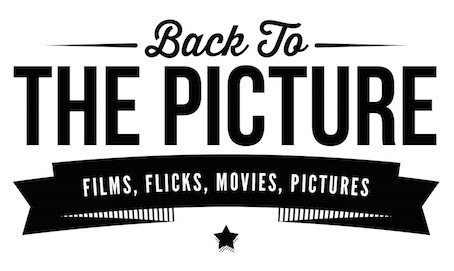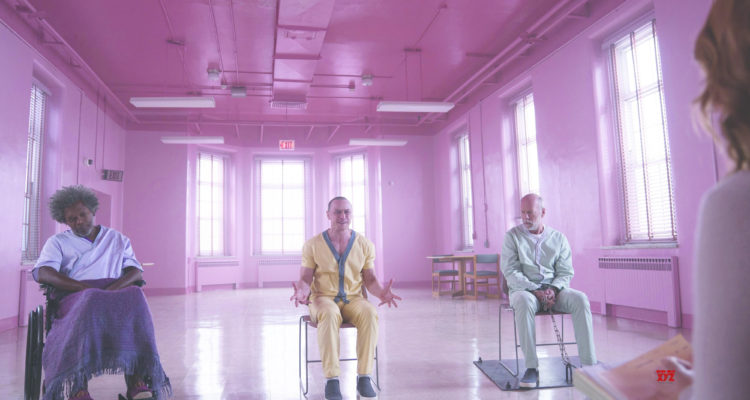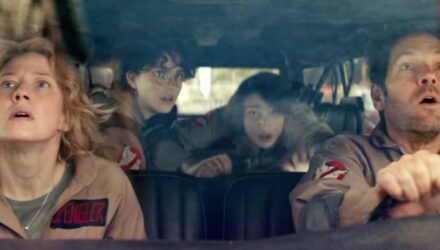If you were hoping for a satisfying conclusion to the Unbreakable trilogy, maybe you should sit this one out.
Following in the footsteps of Unbreakable and Split, Glass sees director/writer M. Night Shyamalan return to the shared universe that makes comic book heroes and villains real. After the climax of Split, the dissociative identity disorder villain containing twenty-three distinct personalities known collectively as The Horde (James McAvoy), is still on the loose and threatening to kidnap and murder as many teenage girls as he can get his hands on before The Beast rears its ugly head and swallows them whole. With no one seeming to be able to track, let alone stop him, David Dunn (Bruce Willis), a home security guard with super strength who can “see” a person’s crimes simply by touching them, decides to take it upon himself to find The Horde and bring him to justice. But when an old enemy by the name of Elijah Price aka Unbreakable’s main villain, Mr. Glass, enters the fray, the idea of heroes and villains coexisting becomes that much more real. Soon, all three are subject to a psychiatric evaluation by Dr. Ellie Staple (Sarah Paulson) to prove or disprove the notion that they are indeed super powered individuals. But will these “comic book” characters be able to get over their traumas and find out who they really are, or is the idea of superheroes and super villains warring against each other all in their heads?
I have to say, I’m extremely disappointed with this one. Not only is Unbreakable my favorite Shyamalan film, but it’s also one of my favorite superhero films, mainly because it’s the furthest thing from a traditional superhero film there is. Being able to deconstruct what it means to be a superhero while finding a new angle into an often bloated and strained genre is no easy feat, but Unbreakable was able to pull it off with flying colors. And then there’s Split, a stealth sequel to Unbreakable that was made apparent only in the final few minutes of the film, successfully setting up a shared universe we never knew we wanted and giving us a real villain to root for who is as sweet as he is insane. With Glass, continuing said universe should be a no brainer, but when it came to the actual execution of this threequel, I was left severely wanting.
First things first (and credit where credit’s due), Glass is a brilliant idea of a film, especially after the last two entries in the series set the stage for something truly unique and epic. But as with most of Shyamalan’s work over the years, things just don’t always go as planned. The story and set-up, while meandering and unfocused for most of the film, isn’t actually half bad: three supers find themselves locked together in what is essentially a psychiatric ward, as they question who they are, what they are, and most importantly, why they are. It’s a fun idea to pose to an audience that’s used to the same-ish superhero stories told in the Marvel and DC universe of films, so refreshing would be a good word to use for this one…if it all panned out the way it was supposed to that is.
Unfortunately, Shyamalan just isn’t able to wrangle all of his lofty ideas and most definitely isn’t able to carry over the same success from previous films, leaving Glass feeling rushed, uninspired, and worst of all, lazy. When approaching a film like this, it’s imperative to establish the stakes, rules and purpose of what’s happening onscreen, but with Glass, none of the above is applicable. The stakes seem nonexistent, the rules vague and confusing, and the purpose, well, the purpose just never makes it front and center enough to justify this film being worth the effort put forth to make it. I don’t know if this was the plan for the trilogy capper the entire time, but this film reeks of filmmakers who thought they knew what they were doing, when in reality they fell prey to becoming the type of film Unbreakable and Split strived not to be: a safe movie watered down and shelled out to the masses to scratch that shared universe itch everyone seems to be obsessed with nowadays.
The acting is great when it comes to the big three actors the film is structured around; James McAvoy literally and figuratively kills it in every scene he’s in, Samuel L. Jackson does some great, subtle, non-“I’m Samuel L. Jackson acting like Samuel L. Jackson” work, and Bruce Willis is able to slip back into his original role without too much fuss, but it’s the script that threatens to ruin these performances more than anything. Sarah Paulson is a great actress, but all of her material came across as her just seeming bored and oddly reserved, while Split’s main actress in Anya Taylor-Joy sees some better material when paired up with McAvoy, but also loses a lot of punch once the script gets too preachy and convoluted. Again, this film had great ingredients, but nothing mixed well enough to call it a success.
By the time the credits roll this film has seen its fair share of ups and downs, both of which give the film a sort of identity crisis that The Horde would be proud of. Derailed by the weight of its own mishandled idea, the film is annoyingly frustrating in many ways, and annoyingly good in others. The script, when its competent, is able to capture the original promise this setup seems to have been going for, but with some truly bad pacing, a plodding and drawn out first and third act, and a couple twists that just aren’t successful enough to be considered anything close to important, Glass could have been so much more, but settles for being so much less. It’s great to see all three main characters come together and interact from both Unbreakable and Split, but with a story that does neither films justice and a script and sense of direction that just isn’t all there, this one will forever go down as a missed opportunity.
5.5
Breakable
The Verdict
5.5





